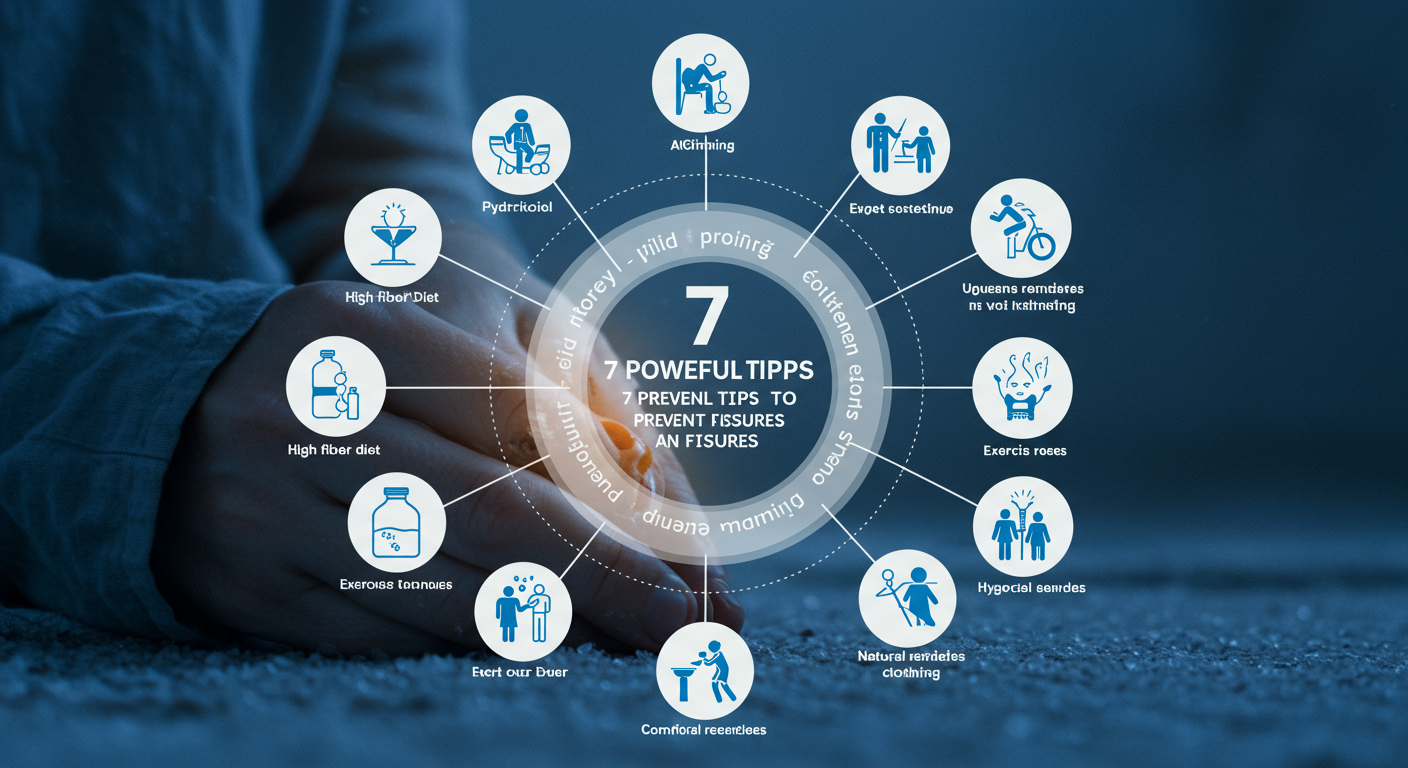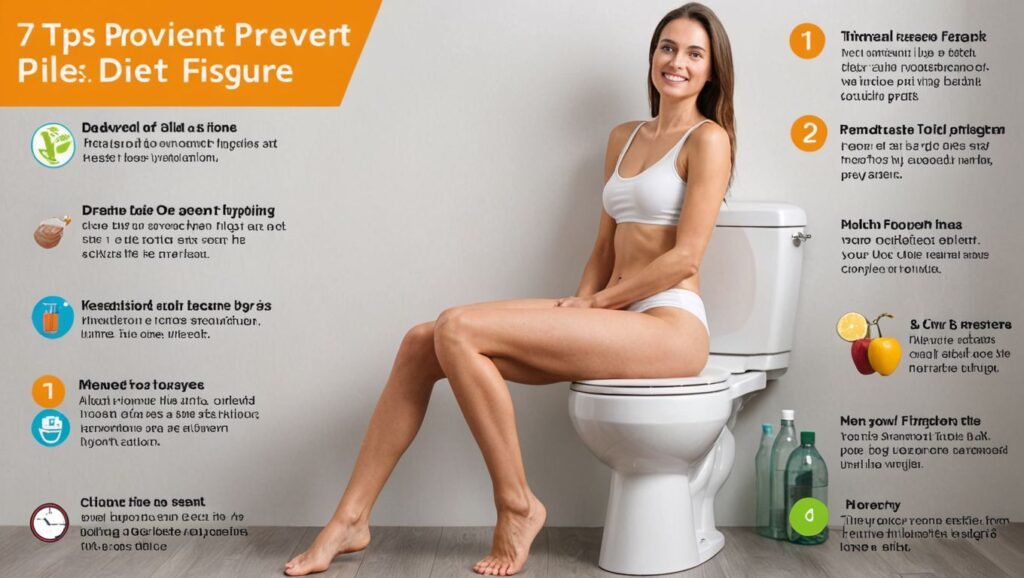
Prevent Piles and Fissures: 7 Powerful Tips!
“7 powerful tips to prevent piles and fissures naturally. Learn effective strategies for long-term relief and health.”

- Introduction
- Health Benefits of Preventing Piles and Fissures
- Health Benefits of Using Natural Remedies for Piles and Fissures
- 7 Health Benefits of Wearing Comfortable Clothing
Introduction
Overview of Piles (Hemorrhoids) and Fissures
Piles, also known as hemorrhoids, are swollen veins in the lower part of the rectum and anus. These veins can become inflamed due to increased pressure, leading to discomfort, pain, and bleeding. Hemorrhoids can be internal, forming inside the rectum, or external, forming under the skin around the anus. Common symptoms include itching, irritation, pain, and swelling around the anal region, as well as bleeding during bowel movements.
Fissures, on the other hand, are small tears or cracks in the lining of the anus. These tears can cause severe pain and bleeding, especially during and after bowel movements. Anal fissures are typically caused by the passage of hard or large stools, but they can also result from chronic diarrhea, inflammatory bowel disease, or trauma to the anal area. Symptoms include sharp pain, bleeding, and itching around the anus.
Importance of Prevention and Maintaining Digestive Health
Preventing piles and fissures is crucial for maintaining overall digestive health and avoiding discomfort and complications. Both conditions can significantly impact a person’s quality of life, causing pain, embarrassment, and anxiety. By adopting preventive measures and maintaining good digestive health, individuals can reduce the risk of developing these conditions and promote long-term well-being.
Effective prevention involves a combination of dietary and lifestyle changes that support healthy bowel movements and reduce strain on the rectal and anal regions. Ensuring proper hydration, consuming a high-fiber diet, practicing good hygiene, and staying physically active are essential strategies for preventing piles and fissures. Additionally, adopting proper toilet techniques and avoiding prolonged sitting can further reduce the risk.
Brief Overview of the 7 Powerful Tips to Be Discussed
In this article, we will explore seven powerful tips to prevent piles and fissures, focusing on practical and effective strategies for long-term relief and health. These tips are designed to promote digestive health, prevent straining during bowel movements, and reduce the risk of developing hemorrhoids and anal fissures. The seven tips include:
- Maintaining a High-Fiber Diet: Incorporate fiber-rich foods to improve digestion and prevent constipation.
- Staying Hydrated: Drink plenty of water to soften stools and ease bowel movements.
- Practicing Proper Toilet Techniques: Adopt the right posture and avoid straining to reduce pressure on the anal region.
- Regular Exercise: Engage in physical activity to promote regular bowel movements and overall digestive health.
- Practicing Good Hygiene: Maintain cleanliness in the anal area to prevent infections and irritation.
- Using Natural Remedies: Utilize natural treatments like aloe vera, witch hazel, and sitz baths for relief and prevention.
- Wearing Comfortable Clothing: Choose breathable, comfortable fabrics to reduce pressure and friction on the anal area.
By following these tips, individuals can take proactive steps to prevent piles and fissures, enhance their digestive health, and improve their overall quality of life.
Health Benefits of Preventing Piles and Fissures
Health Benefits of Maintaining a High-Fiber Diet
Importance of Fiber for Digestive Health
Explanation of How Fiber Aids Digestion: Fiber is an essential component of a healthy diet, playing a crucial role in maintaining digestive health. It helps regulate the body’s use of sugars, keeps hunger and blood sugar levels in check, and ensures smooth bowel movements. There are two types of fiber—soluble and insoluble. Soluble fiber dissolves in water to form a gel-like substance, which helps slow down digestion and provides a feeling of fullness. Insoluble fiber, on the other hand, adds bulk to stools and aids in their passage through the digestive system.
Types of Fiber-Rich Foods to Include in the Diet:
- Fruits: Apples, oranges, berries, and pears
- Vegetables: Broccoli, carrots, Brussels sprouts, and leafy greens
- Whole Grains: Oats, brown rice, quinoa, and whole wheat products
- Legumes: Beans, lentils, chickpeas, and peas
- Nuts and Seeds: Almonds, chia seeds, flaxseeds, and sunflower seeds
Reducing the Risk of Constipation
How Fiber Helps Prevent Constipation: Constipation occurs when bowel movements become infrequent or difficult to pass. Fiber helps prevent constipation by adding bulk to stools, making them easier to pass. It also absorbs water, which softens the stool and promotes regular bowel movements.
Role of Fiber in Softening Stools and Easing Bowel Movements: Fiber’s water-absorbing properties ensure that stools remain soft and well-formed, reducing the risk of straining during bowel movements. By facilitating the smooth passage of stools, fiber helps prevent the development of hemorrhoids and anal fissures.
Health Benefits of Staying Hydrated
Hydration and Digestive Health
Importance of Drinking Enough Water for Digestive Function: Staying hydrated is essential for maintaining proper digestive function. Water helps break down food so that the body can absorb nutrients effectively. It also keeps the digestive system well-lubricated, preventing constipation and promoting regular bowel movements.
Recommended Daily Water Intake: The amount of water each person needs can vary based on factors like age, gender, and activity level. However, a general guideline is to aim for about 8 glasses (2 liters) of water per day. It’s important to listen to your body and drink water regularly throughout the day, especially when you feel thirsty.
Preventing Hard Stools and Straining
How Hydration Helps Soften Stools: Adequate water intake is crucial for softening stools and making them easier to pass. When the body is well-hydrated, it can absorb water into the intestines, keeping stools soft and preventing constipation.
Reducing the Risk of Straining During Bowel Movements: By ensuring that stools are soft and well-hydrated, adequate water intake reduces the need to strain during bowel movements. This, in turn, helps prevent the development of hemorrhoids and anal fissures, which can result from excessive straining.
3. Health Benefits of Practicing Proper Toilet Techniques
Proper Toilet Posture
Importance of Maintaining a Proper Toilet Posture: The position you adopt while using the toilet can significantly impact your bowel movements. Sitting in the wrong posture can cause unnecessary strain on the rectum and anus, leading to discomfort and complications such as hemorrhoids and fissures.
Tips for Achieving the Right Posture:
- Use a Footstool: Placing your feet on a small footstool while sitting on the toilet can help mimic a squatting position, which aligns the colon properly and eases bowel movements.
- Lean Forward: Leaning slightly forward with your elbows on your knees can help position your rectum for easier stool passage.
- Relax: Ensure you are relaxed and take your time. Avoid rushing or straining during bowel movements.
Avoiding Straining and Prolonged Sitting
How to Avoid Straining During Bowel Movements: Straining during bowel movements can increase pressure on the veins in the rectum and anus, leading to hemorrhoids and fissures. To avoid straining:
- Respond to Natural Urges: Go to the bathroom when you feel the need, and don’t hold it in.
- Take Your Time: Avoid rushing. Give yourself time to complete your bowel movement without forcing it.
Reducing Time Spent Sitting on the Toilet: Prolonged sitting on the toilet can exacerbate pressure on the anal region. To reduce time spent sitting:
- Avoid Distractions: Refrain from using electronic devices or reading materials while on the toilet.
- Set a Time Limit: Aim to complete your bowel movements within a reasonable timeframe, usually within a few minutes.
4. Health Benefits of Regular Exercise
Exercise and Digestive Health
Role of Physical Activity in Promoting Digestive Health: Regular physical activity is essential for maintaining overall health, including digestive health. Exercise helps stimulate intestinal contractions, promoting regular bowel movements and reducing the risk of constipation. It also helps manage stress, which can impact digestion.
Types of Exercises That Benefit the Digestive System:
- Aerobic Exercises: Walking, jogging, swimming, and cycling
- Strength Training: Weightlifting and resistance exercises
- Flexibility Exercises: Yoga and stretching routines
- Core Strengthening: Exercises that target the abdominal muscles
Improving Bowel Regularity
How Exercise Helps Maintain Regular Bowel Movements: Physical activity increases blood flow to the digestive organs and stimulates the muscles in the intestines, promoting regular bowel movements. Regular exercise helps maintain a healthy digestive system and reduces the risk of developing hemorrhoids and fissures.
Examples of Exercises to Include in Daily Routine:
- Walking: Aim for at least 30 minutes of brisk walking daily.
- Yoga: Practice yoga poses that aid digestion, such as the Cat-Cow stretch, Child’s Pose, and Wind-Relieving Pose.
- Strength Training: Include exercises like squats, lunges, and planks to strengthen core muscles and improve overall fitness.
Health Benefits of Using Natural Remedies for Piles and Fissures
Piles (hemorrhoids) and fissures can cause significant discomfort and pain, but natural remedies offer a gentle and effective way to manage these conditions. From soothing aloe vera to the healing properties of witch hazel, nature provides powerful solutions. In this article, we’ll explore the health benefits of using natural remedies for piles and fissures, along with practical tips for incorporating them into your daily routine.
Aloe Vera and Witch Hazel
Benefits of Aloe Vera and Witch Hazel
- Aloe Vera: Known for its anti-inflammatory and soothing properties, aloe vera reduces swelling and promotes healing.
- Witch Hazel: A natural astringent, witch hazel helps shrink swollen tissues and relieves itching and discomfort.
How to Use These Natural Remedies Effectively
- Aloe Vera Gel:
- Extract fresh gel from an aloe vera leaf.
- Apply directly to the affected area for instant relief.
- Use 2–3 times daily.
- Witch Hazel:
- Soak a cotton pad in witch hazel extract.
- Gently apply to the affected area.
- Use after bowel movements or as needed.
Sitz Baths and Essential Oils
Benefits of Sitz Baths
- Sitz Baths: Warm water baths help relax the anal muscles, reduce inflammation, and promote healing.
- How to Take a Sitz Bath:
- Fill a shallow tub with warm water.
- Add Epsom salt for added relief.
- Sit for 15–20 minutes, 2–3 times daily.
How to Use Essential Oils for Relief
- Tea Tree Oil: Dilute with a carrier oil (e.g., coconut oil) and apply to the affected area for its antiseptic properties.
- Lavender Oil: Mix with warm water for a soothing sitz bath.
7 Health Benefits of Wearing Comfortable Clothing
Wearing the right clothing can significantly impact your comfort and health, especially when dealing with piles and fissures. Here’s how:
Choosing the Right Fabrics
Importance of Breathable Fabrics
- Cotton and Bamboo: These fabrics allow airflow, reducing moisture buildup and preventing irritation.
- Avoid Synthetic Fabrics: Materials like polyester can trap heat and moisture, worsening discomfort.
Tips for Selecting the Right Clothing
- Opt for loose-fitting underwear and pants.
- Choose seamless designs to minimize friction.
Reducing Pressure and Friction
How Comfortable Clothing Helps
- Reduces Pressure: Loose clothing prevents unnecessary pressure on the anal area.
- Prevents Friction: Soft, breathable fabrics minimize irritation and promote healing.
Conclusion
Incorporating natural remedies and wearing comfortable clothing can provide significant relief from piles and fissures. From the soothing effects of aloe vera and witch hazel to the benefits of sitz baths and breathable fabrics, these practices promote healing and comfort.
Final Thoughts
Maintaining overall digestive health is key to preventing piles and fissures. Stay hydrated, eat a fiber-rich diet, and incorporate these natural remedies and lifestyle changes for long-term relief and well-being.
You may also like
Calendar
| S | M | T | W | T | F | S |
|---|---|---|---|---|---|---|
| 1 | 2 | 3 | 4 | 5 | ||
| 6 | 7 | 8 | 9 | 10 | 11 | 12 |
| 13 | 14 | 15 | 16 | 17 | 18 | 19 |
| 20 | 21 | 22 | 23 | 24 | 25 | 26 |
| 27 | 28 | 29 | 30 | |||
